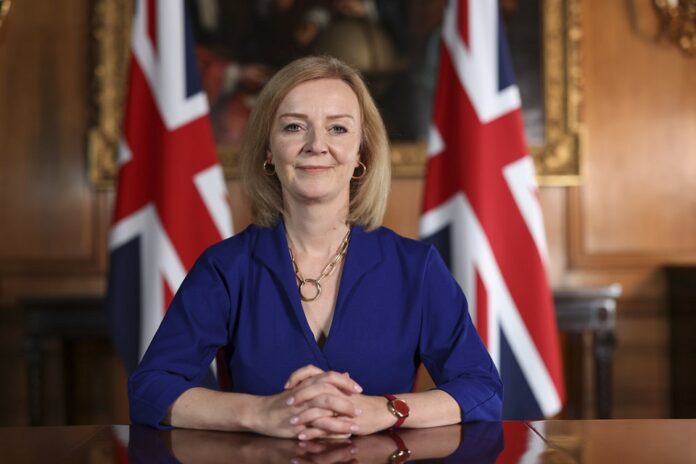London (CNN)Liz Truss will be the next prime minister of the United Kingdom after winning most votes in the Conservative Party leadership contest, succeeding Boris Johnson who resigned in July after a series of scandals.
Truss defeated rival Rishi Sunak with 81,326 votes to 60,399 among party members and will take over as leader on Tuesday, as Britons face mounting economic and social crisis.
She pledged action to tackle the crisis in a short victory speech at a conference center in London on Monday. Without offering details, Truss promised a “bold plan” to cut taxes and build economic growth, and “deliver on the energy crisis, dealing with people’s energy bills but also dealing with the long-term issues we have on energy supply.”
Monday’s announcement ends weeks of bitter campaigning during which Sunak, the former Chancellor of the Exchequer (finance minister), accused the Foreign Secretary of risking a prolonged recession if she goes ahead with her promised tax cuts.
Once Johnson formally resigns his post to the Queen on Tuesday, Truss will also visit the monarch at her Scottish residence Balmoral, where, as leader of the largest party in parliament, she will be invited to form a government.
Truss had been the frontrunner for weeks, and the 47-year-old will now follow Margaret Thatcher and Theresa May to become Britain’s third female premier. Despite voting to remain in the European Union back in 2016, she has found herself to be the preferred candidate of the vast majority of Brexiteers in her party.
Her victory was smaller than expected, Conservatives who supported both candidates are privately admitting. It had been predicted by many that her margin of victory would be larger than the 18 percentage points announced on Monday afternoon.
In terms of her premiership, this could mean that she cannot run roughshod over her MPs, who voted in greater numbers for Sunak than Truss in the parliamentary part of this leadership contest.
And Truss could find that she has to accommodate a wider range of views from her party, which could mean embracing Sunak’s ideas for helping Britons with the cost-of-living crisis and a less aggressive approach to tax cuts — especially corporation tax.
Many Conservative MPs are privately worried that Truss’s modern-day Thatcherism could cost them the next election and will be leaping on the surprisingly low margin of victory to encourage the next PM to soften her economic stance.
The opposition Labour Party immediately dismissed her arguments, saying in a statement, “after years serving in Tory cabinets, nodding through the decisions that got us into this mess, Liz Truss simply doesn’t have the answers to this crisis.”
Long political journey
In the leadership campaign, Truss’s platform had featured plenty of red meat for the Conservative membership, from a hard line against the EU on Brexit to tax cuts as her main solution to the cost-of-living crisis. This tactic clearly proved decisive in winning over ordinary members, who had the final say in electing the leader of the ruling party, who consequently becomes prime minister.
But critics have accused her new-found hardline Brexit stance of being a cynical ploy. They have pointed to the fact that throughout her adult life Truss has evolved, from being an anti-monarchist Liberal Democrat in favor of legalizing drugs in her youth to the embodiment of the Conservative right today.
Throughout her political career, especially during the leadership contest, Truss has been compared to Thatcher, who, for many on the right, remains the benchmark for Conservative leaders. She was a tax-cutting, hard-nosed leader who took on the unions and played a large role in ending the Cold War. Like Thatcher, Truss has come from relatively humble beginnings to dominate a world inhabited largely by men.
Since becoming an MP, Truss has gone from being the darling of the liberal Conservative leader David Cameron, who took a personal interest in her career, to the Euroskeptic right’s figurehead. Before the Brexit referendum, Truss said that she was “backing remain as I believe it is in Britain’s economic interest and means we can focus on vital economic and social reform at home.”
Cabinet colleagues at the time say that she never voiced any issue about supporting staying in the EU, despite having ample opportunities to express her own Euroskepticism.
These days, Truss is more than happy to pick fights with Brussels and to claim that it was the EU all along that held the British economy back.
A country in turmoil
Truss will take over a Conservative government that is facing multiple crises in the country. With steep rises in energy and food prices, long waiting lists for hospital treatment, and public sector workers, dock workers and even lawyers going on strike, making the case that the party deserves to win a historic fifth term at the next general election — due to be called by December 2024 at the latest — will be an uphill battle.
Inflation rose above 10% in July for the first time in 40 years, driven largely by the rising cost of energy, food and fuel. According to a forecast by the Bank of England, inflation will soar to 13% by the end of the year. The central bank also predicted that the UK would enter into recession before the end of the year. And on Monday, in a signal of these serious challenges ahead, the British pound dropped 0.3% to its lowest level against the US dollar since 1985.
Analysts are skeptical that Truss’s tax-cutting policies will do much help citizens, especially after a decade of austerity policies. The Institute for Fiscal studies, an independent research group focusing on public finances, said last month that the leadership contestants, who were both promising tax cuts and smaller government spending, “need to recognise this even greater-than-usual uncertainty in the public finances.” / CNN
VIDEO














